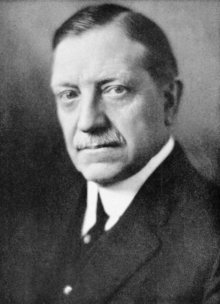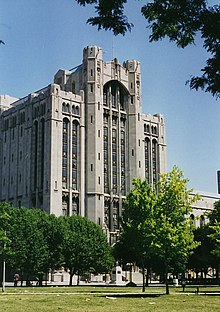George D. Mason
George D. Mason | |
|---|---|
 | |
| Born | George DeWitt Mason July 4, 1856 Syracuse, New York |
| Died | June 3, 1948 (aged 91) Detroit, Michigan |
| Burial place | Evergreen Cemetery |
| Occupation | Architect |
| Spouse |
Ida Whitaker (m. 1882) |
| Children | 1 |
| Signature | |
George DeWitt Mason (July 4, 1856 – June 3, 1948) was an American architect who practiced in Detroit, Michigan, in the latter part of the 19th and early decades of the 20th centuries.[1]
George Mason was born in Syracuse, New York, the son of James H. and Zelda E. Mason. In 1870 the family moved to Detroit, where Mason received his early education.[2][3]
Career
[edit]
Mason began his architectural career working for Detroit architect Hugh Smith in 1875, but this only lasted a summer. After this he moved to the firm of Henry T. Brush, where he worked for the first nine months without pay. Mason started out assigned to some specific detailing work on the George O. Robinson House[4] and the Detroit Public Library.[5] One of the first buildings in which Mason received equal billing for the design was the Ransom Gillis House.[6] In 1878 he joined with Zachariah Rice to form the firm Mason & Rice. This partnership lasted until 1898, after which time Mason continued his practice alone.[7]
Mason married Ida Whitaker in 1882, and they had one daughter.[2] From 1884 until 1896 Albert Kahn worked with Mason and Rice, and he returned to partner with Mason for a few years early in the 20th century.[8] A number of Mason's works, either by himself or as part of Mason & Rice, are listed on the National Register of Historic Places.[9]
Mason died on June 3, 1948, at his home in the Wilshire Apartments building, at the age of 91. He was buried at Evergreen Cemetery in Detroit.[3]
Selected commissions
[edit]

- Ransom Gillis House 205 Alfred Street (with Henry T Brush) (1876 or 1878)
- Michigan Central Railroad Chelsea Depot (with Rice), Chelsea, Michigan (1880)
- Cass Avenue Methodist Episcopal Church (with Rice) (1883) (chapel only; while the building stands, it has been totally refaced) 901 Cass Avenue.
- Marine City City Hall (with Rice) (1884) (300 Broadway Marine City, MI) (Richardson Romanesque)
- Thompson Home (with Rice)[10] 4756 Cass Avenue (1884)
- George and Martha Hitchcock House (with Rice), Farwell, Michigan (1885)
- Grand Hotel (with Rice), Mackinac Island (1887)
- First Presbyterian Church (with Rice) 2930 Woodward Avenue (1889)
- Trinity Episcopal Church (with Rice) 1519 Martin Luther King Boulevard (1890)
- Engine House No. 18 (with Rice) (1892)
- Belle Isle Police Station (with Rice) (1893)[11]
- Franklin H. Walker House (with Rice) 2730 East Jefferson (1896). Demolished in 1990s
- Century Theatre (1903)
- Palms Apartments (with Kahn) (1903)
- Belle Isle Aquarium (with Kahn) (1904)
- Trinity United Methodist Church (1922), 13100 Woodward Avenue, Highland Park, Michigan.
- Detroit Yacht Club (1923) 1 Riverbank Road.
- Detroit Masonic Temple (1926) 500 Temple.
- Gem Theatre (1927) Moved from 62 Columbia to 353 Madison in 1997.
- Central Woodward Christian Church (1928) 9000 Woodward Avenue.
- Detroit College of Law Building (1937) 130 East Elizabeth. Demolished in 1990s
See also
[edit]References
[edit]- ^ Hill, Eric J.; Gallagher, John (2002). AIA Detroit: The American Institute of Architects Guide to Detroit Architecture. Wayne State University Press. p. 341. ISBN 0-8143-3120-3.
- ^ a b Moore, Charles (1915). History of Michigan. Vol. IV. Chicago: The Lewis Publishing Company. pp. 1785–1786. Retrieved 2023-03-09 – via Internet Archive.
- ^ a b "George Mason Dies; Was Noted Architect". Detroit Free Press. 1948-06-05. p. 17. Retrieved 2023-03-09 – via Newspapers.com.
- ^ The Picturesque Style: Italianate Architecture: The George O. Robinson House, Detroit, Michigan May 5, 2013
- ^ Ferry, W. Hawkins (1980). The Buildings of Detroit: A History. Wayne State University Press, Detroit, Michigan. pp. 86, 90.
- ^ Ransom Gillis Home Archived March 28, 2016, at the Wayback Machine. Detroit1701. Retrieved on November 24, 2010.
- ^ Pipp, E. G. (1927). Men Who Have Made Michigan. Pipp's Magazine. p. 52.
- ^ "UMichigan Architecture: Albert Kahn". Archived from the original on 2012-03-16. Retrieved 2011-07-02.
- ^ "National Register Information System". National Register of Historic Places. National Park Service. July 9, 2010.
- ^ "Thompson Home for Old Ladies | DPL DAMS".
- ^ Ferry, W. Hawkins (1980). The Buildings of Detroit: A History. Wayne State University Press, Detroit, Michigan. p. 140
Further reading
[edit]- Eckhert, Katheryn Bishop (1993). Buildings of Michigan (Society of Architectural Historians). New York: Oxford University Press. ISBN 0-19-506149-7.
- Kvaran, Einar Einarsson, Architectural Sculpture in America, unpublished manuscript.
- Masonic Temple, Detroit, Michigan A.D. 1926, A.L. 5926 dedication booklette, no date, copyright or publishing information.
- Parducci, Corrado, Work Records of Corrado J. Parducci, unpublished manuscript.
- University of Michigan Architecture: Albert Khan at the Wayback Machine (archived March 16, 2012)

